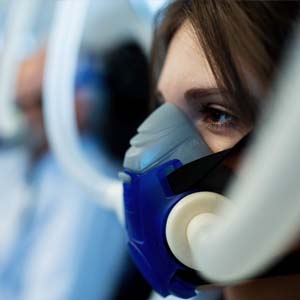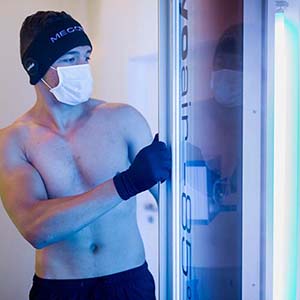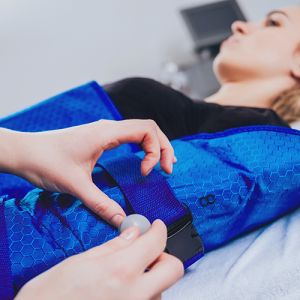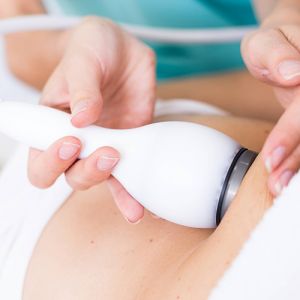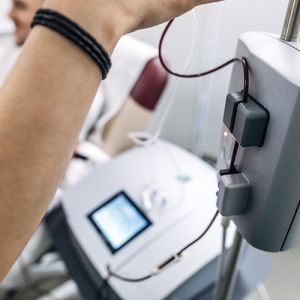LONG-TERM EFFECTS
OF CORONAVIRUS
(LONG COVID)
Long-term effects
of coronavirus
(Long COVID)
Coronavirus (COVID-19) can leave some people with symptoms that continue for weeks or months after the infection has passed. This is also known as “Long COVID” or “post-COVID-19 syndrome.”
ON THIS PAGE
Supporting your
long covid recovery
You may still be coming to terms with the impact COVID-19 has had on both your body and mind while you heal from the virus. These changes should improve with time, but some may take longer than others. However, there are things you can do to help aid and speed up your recovery.
What is Long COVID?
The majority of COVID infections clear up within the first four weeks. “Long COVID” is a colloquial phrase for signs and symptoms that persist or worsen following a COVID infection. It can be one of two things, depending on how long you’ve been experiencing symptoms:
Ongoing symptomatic COVID – If your symptoms last longer than four weeks, you’ve reached this stage. If your symptoms linger longer than 12 weeks, you will be diagnosed with;
Post-COVID Syndrome – When your symptoms last longer than 12 weeks and can’t be explained by anything else, you’ve reached this stage.
What are Long Covid Symptoms?
Long Covid symptoms can be complex and diverse, and they can change over time. Among the most commonly reported symptoms to include (but are not limited to):
Respiratory & Cardiovascular symptoms – Breathlessness | Cough | Chest tightness | Chest pain | Palpitations
Generalised symptoms – Fatigue | Fever | Pain
Neurological symptoms – Cognitive impairment (‘brain fog’, loss of concentration or memory issues) | Headache | Sleep disturbance | Pins and needles or numbness | Dizziness | Delirium (in older people)
Gastrointestinal symptoms (digestive system) – Abdominal pain | Nausea | Diarrhoea | Anorexia and reduced appetite (in older people) | Weight loss
Musculoskeletal symptoms – Joint pain | Muscle pain
Psychological/psychiatric symptoms – Symptoms of depression | Symptoms of anxiety
Ear, nose and throat symptoms – Tinnitus | Earache | Sore throat | Loss of taste and/or smell
Dermatological symptoms – Skin rashes
Clinicians and researchers from all over the world are trying to figure out what happens to people as they recover. They’re also attempting to figure out if there are any long-term complications. They’re trying to figure out which treatments work and how to prevent sickness in the future. You may be requested to participate in studies during your recovery.
We don’t know exactly what will happen to people as they recover at the time of writing, but there is a lot of information to help assist us. We’re drawing on data from countries whose disease peaks were earlier than in the UK. We’re also drawing on experience with other types of pneumonia recovery.
Some people with COVID will be able to manage their symptoms at home, while others will need to go to the hospital. Individuals with severe COVID disease require a high amount of respiratory care while in the hospital. It’s possible that people who needed a lot of supplemental oxygen or a bedside machine to help them breathe were able to breathe on their own.
What might happen to me?
This page was created by Pure Medical for you, the person, not the virus. The information is intended to assist you in recovering from your condition. Whatever issues you’re dealing with are important if they’re causing you anxiety or limiting your options. Every experience is one-of-a-kind.
The acute disease causes a variety of symptoms. Coughs, fevers, muscle aches, and lethargy (tiredness/exhaustion) are all common symptoms. Some people became short of breath. We are aware that symptoms such as loss of taste and smell were prevalent. Other viruses cause fewer of the later symptoms.
Many individuals will recover completely. It could take anywhere from a few weeks to several months. Cough, shortness of breath, poor or limited sleep, fatigue, anxiety, and low mood are all expected to persist in some persons.
The recovery time is different for everyone. The length of your recovery is not necessarily related to the severity of your initial illness or whether you were in the hospital. If new or ongoing symptoms do occur and they are causing you concern, you should always seek medical advice and support.
Alternative and Complementary therapies used
when treating Patients suffering from Long Covid
Long Covid Treatment & Therapy
Scientific Studies
In this section, you will find an array of Long Covid Treatment & Therapy scientific case studies.
Hyperbaric Oxygen Therapy (HBOT)
Tim Robbins, Michael Gonevski, Cain Clark, Sudhanshu Baitule, Kavi Sharma, Angel Magar, Kiran Patel, Sailesh Sankar, Ioannis Kyrou, Asad Ali and Harpal S Randeva
RCP Journals – November 2021 – doi.org/10.7861/clinmed.2021-0462
Hyperbaric Oxygen Therapy (HBOT)
Shai Efrati, Prof.
NIH – December 2020 – NCT: NCT04647656
Hyperbaric Oxygen Therapy (HBOT)
Shahram Oliaei, SeyedAhmad SeyedAlinaghi, Mohammad Mehrtak, Amirali Karimi, Tayebeh Noori, Pegah Mirzapour, Alireza Shojaei, Mehrzad MohsseniPour, Seyed Peyman Mirghaderi, Sanam Alilou, Parnian Shobeiri, Hadiseh Azadi Cheshmekabodi, Esmaeil Mehraeen & Omid Dadras
BMC – 19 August 2021 – Article number: 96 (2021)
Hyperbaric Oxygen Therapy (HBOT)
Anders Kjellberg, Antonio De Maio and Peter Lindholm
NCBI – November 2020 – PMID: 33254531
Ozone Therapy
Morteza Izadi, Luca Cegolon, Mohammad Javanbakht, Ali Sarafzadeh, Hassan Abolghasemi, Gholamhossein Alishiri, Shi Zhao, Behzad Einollahi, Mandana Kashaki, Nematollah Jonaidi-Jafaria, Mosa Asadi, Ramezan Jafari, Saeid Fathi, Hassan Nikoueinejad, Mehrdad Ebrahimi, Sina Imanizadeh, Amir Hosein Ghazalek
Science Direct – March 2021 – 107307
Ozone Therapy
Mili Shah, Jignasha Captain, Vidyadhar Vaidya, Arvind Kulkarni, Kedar Valsangkar, Pradeep M.K. Nair, and Gayatri Ganu
NCBI – February 2021 – PMID: 33421928
Red Light Therapy
Chukuka Samuel Enwemeka, Violet Vakunseh Bumah, and Daniela Santos Masson-Meyers
NCBI – June 2020 – PMID: 32388486
Photo-biomodulation Therapy
Brenda Thaynne Lima de Matos, Daniela Vieira Buchaim, Karina Torres Pomini, Sandra Maria Barbalho, Elen Landgraf Guiguer, Carlos Henrique Bertoni Reis, Cleuber Rodrigo de Souza Bueno, Marcelo Rodrigues da Cunha, Eliana de Souza Bastos Mazuqueli Pereira, and Rogerio Leone Buchaim
NCIB – June 2021 – PMID: 34207199
SUPPORTING YOUR LONG COVID RECOVERY
You may still be coming to terms with the impact COVID-19 has had on both your body and mind while you heal from the virus. These changes should improve with time, but some may take longer than others. However, there are things you can do to help aid and speed up your recovery.
WHAT IS LONG COVID?
The majority of COVID infections clear up within the first four weeks. “Long COVID” is a colloquial phrase for signs and symptoms that persist or worsen following a COVID infection. It can be one of two things, depending on how long you’ve been experiencing symptoms:
Ongoing symptomatic COVID – If your symptoms last longer than four weeks, you’ve reached this stage. If your symptoms linger longer than 12 weeks, you will be diagnosed with;
Post-COVID Syndrome – When your symptoms last longer than 12 weeks and can’t be explained by anything else, you’ve reached this stage.
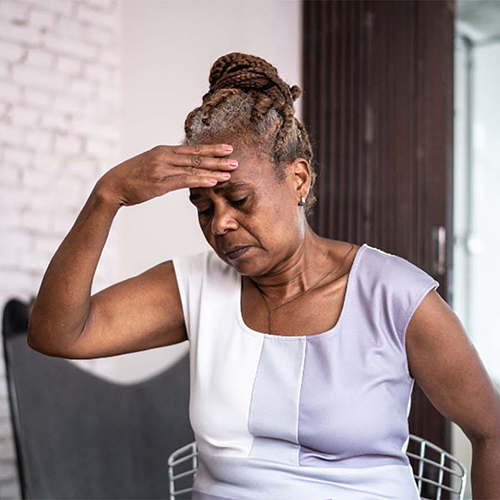
WHAT ARE LONG COVID SYMPTOMS?
Long Covid symptoms can be complex and diverse, and they can change over time. Among the most commonly reported symptoms to include (but are not limited to):
Respiratory & Cardiovascular symptoms – Breathlessness | Cough | Chest tightness | Chest pain | Palpitations
Generalised symptoms – Fatigue | Fever | Pain
Neurological symptoms – Cognitive impairment (‘brain fog’, loss of concentration or memory issues) | Headache | Sleep disturbance | Pins and needles or numbness | Dizziness | Delirium (in older people)
Gastrointestinal symptoms (digestive system) – Abdominal pain | Nausea | Diarrhoea | Anorexia and reduced appetite (in older people) | Weight loss
Musculoskeletal symptoms– Joint pain | Muscle pain
Psychological/psychiatric symptoms – Symptoms of depression | Symptoms of anxiety
Ear, nose and throat symptoms – Tinnitus | Earache | Sore throat | Loss of taste and/or smell
Dermatological symptoms – Skin rashes
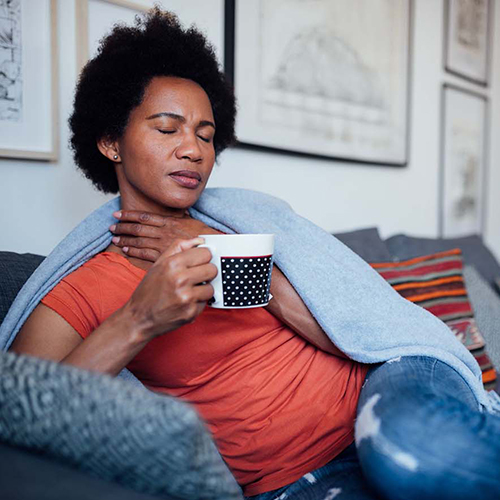
Clinicians and researchers from all over the world are trying to figure out what happens to people as they recover. They’re also attempting to figure out if there are any long-term complications. They’re trying to figure out which treatments work and how to prevent sickness in the future. You may be requested to participate in studies during your recovery.
We don’t know exactly what will happen to people as they recover at the time of writing, but there is a lot of information to help assist us. We’re drawing on data from countries whose disease peaks were earlier than in the UK. We’re also drawing on experience with other types of pneumonia recovery.
Some people with COVID will be able to manage their symptoms at home, while others will need to go to the hospital. Individuals with severe COVID disease require a high amount of respiratory care while in the hospital. It’s possible that people who needed a lot of supplemental oxygen or a bedside machine to help them breathe were able to breathe on their own.
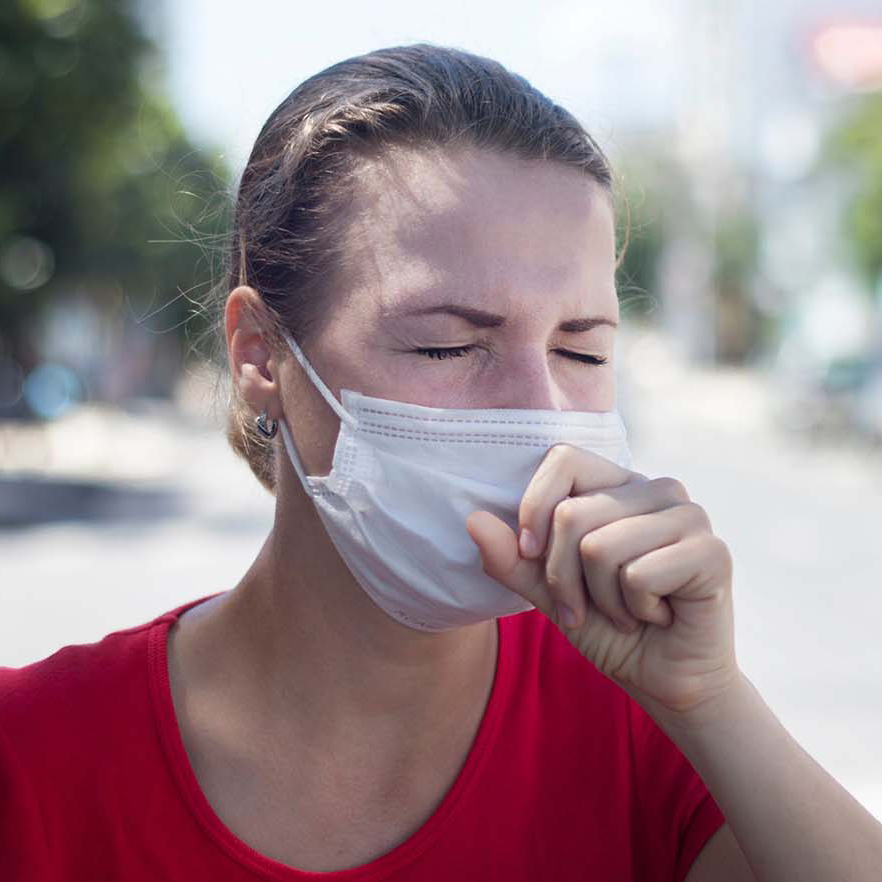
WHAT MIGHT HAPPEN TO ME?
This page was created by Pure Medical for you, the person, not the virus. The information is intended to assist you in recovering from your condition. Whatever issues you’re dealing with are important if they’re causing you anxiety or limiting your options. Every experience is one-of-a-kind./div>
The acute disease causes a variety of symptoms. Coughs, fevers, muscle aches, and lethargy (tiredness/exhaustion) are all common symptoms. Some people became short of breath. We are aware that symptoms such as loss of taste and smell were prevalent. Other viruses cause fewer of the later symptoms.
Many individuals will recover completely. It could take anywhere from a few weeks to several months. Cough, shortness of breath, poor or limited sleep, fatigue, anxiety, and low mood are all expected to persist in some persons.
The recovery time is different for everyone. The length of your recovery is not necessarily related to the severity of your initial illness or whether you were in the hospital. If new or ongoing symptoms do occur and they are causing you concern, you should always seek medical advice and support.
Treatments & therapies Pure Medical use
when treating Patients suffering from Long Covid
Long Covid Treatment & Therapy
Scientific Studies
In this section, you will find an array of Long Covid Treatment & Therapy scientific case studies.
Hyperbaric Oxygen Therapy (HBOT)
Tim Robbins, Michael Gonevski, Cain Clark, Sudhanshu Baitule, Kavi Sharma, Angel Magar, Kiran Patel, Sailesh Sankar, Ioannis Kyrou, Asad Ali and Harpal S Randeva
RCP Journals – November 2021 – doi.org/10.7861/clinmed.2021-0462
Hyperbaric Oxygen Therapy (HBOT)
Shai Efrati, Prof.
NIH – December 2020 – NCT: NCT04647656
Hyperbaric Oxygen Therapy (HBOT)
Shahram Oliaei, SeyedAhmad SeyedAlinaghi, Mohammad Mehrtak, Amirali Karimi, Tayebeh Noori, Pegah Mirzapour, Alireza Shojaei, Mehrzad MohsseniPour, Seyed Peyman Mirghaderi, Sanam Alilou, Parnian Shobeiri, Hadiseh Azadi Cheshmekabodi, Esmaeil Mehraeen & Omid Dadras
BMC – 19 August 2021 – Article number: 96 (2021)
Hyperbaric Oxygen Therapy (HBOT)
Anders Kjellberg, Antonio De Maio and Peter Lindholm
NCBI – November 2020 – PMID: 33254531
Ozone Therapy
Morteza Izadi, Luca Cegolon, Mohammad Javanbakht, Ali Sarafzadeh, Hassan Abolghasemi, Gholamhossein Alishiri, Shi Zhao, Behzad Einollahi, Mandana Kashaki, Nematollah Jonaidi-Jafaria, Mosa Asadi, Ramezan Jafari, Saeid Fathi, Hassan Nikoueinejad, Mehrdad Ebrahimi, Sina Imanizadeh, Amir Hosein Ghazalek
Science Direct – March 2021 – 107307
Ozone Therapy
Mili Shah, Jignasha Captain, Vidyadhar Vaidya, Arvind Kulkarni, Kedar Valsangkar, Pradeep M.K. Nair, and Gayatri Ganu
NCBI – February 2021 – PMID: 33421928
Red Light Therapy
Chukuka Samuel Enwemeka, Violet Vakunseh Bumah, and Daniela Santos Masson-Meyers
NCBI – June 2020 – PMID: 32388486
Photo-biomodulation Therapy
Brenda Thaynne Lima de Matos, Daniela Vieira Buchaim, Karina Torres Pomini, Sandra Maria Barbalho, Elen Landgraf Guiguer, Carlos Henrique Bertoni Reis, Cleuber Rodrigo de Souza Bueno, Marcelo Rodrigues da Cunha, Eliana de Souza Bastos Mazuqueli Pereira, and Rogerio Leone Buchaim
NCIB – June 2021 – PMID: 34207199


